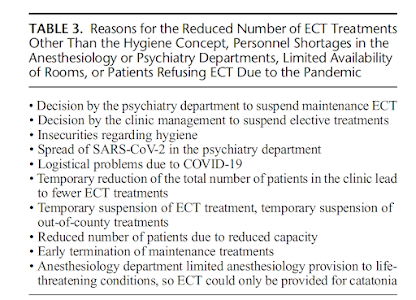ECT During COVID: Survey Results From Germany, Austria and Switzerland
Out on PubMed, in JECT, from investigators in Germany, is this paper:
Provision of Electroconvulsive Therapy During the COVID-19 Pandemic: A Survey Among Clinics in Germany, Austria, and Switzerland.
J ECT. 2022 Apr 14. doi: 10.1097/YCT.0000000000000846. Online ahead of print.PMID: 35462387
The abstract is copied below:
The coronavirus disease 2019 (COVID-19) pandemic has had a marked impact on psychiatry. Capacity reductions also affected electroconvulsive therapy (ECT), even though ECT is an essential rather than an elective procedure. We sent a survey to all 197 clinics in Germany, Austria, and Switzerland with an ECT service between March and May 2021 to provide an overview of the changes made to ECT services in these countries during the acute phase of the COVID-19 pandemic. More than a quarter of the clinics (27.0%) reported a temporary suspension of all ECT treatments, and 28.2% of the clinics reported reductions of up to 75%. Maintenance ECT was suspended in 46.7% of the clinics and reduced by up to 75% in 30.6% of the clinics. At the time of the survey, 40.8% of the clinics still reported lower numbers of ECT treatments compared with the pre-pandemic situation. Reasons for the reduced number of ECT treatments included patient safety and testing measures, personnel shortages in the anesthesiology departments, and limited availability of rooms. The COVID-19 pandemic had and continues to have a marked negative impact on the provision of ECT in clinics in Germany, Austria, and Switzerland. To avoid negative consequences for patients, ECT clinics should urgently take steps to provide ECT services without disruptions.The article is here.
And from the text:
This is an excellent addition to the ECT literature about service provision in German speaking countries during the COVID pandemic. The data about the particular vulnerability of maintenance ECT are noteworthy. The discussion of better planning for the next pandemic to try to prevent ECT service disruptions is very thoughtful.
While the details are European, the problems are universal and generalizable, making a full read of this paper a worthwhile expenditure of ~ 15 minutes for all ECT practitioners.




Comments
Post a Comment